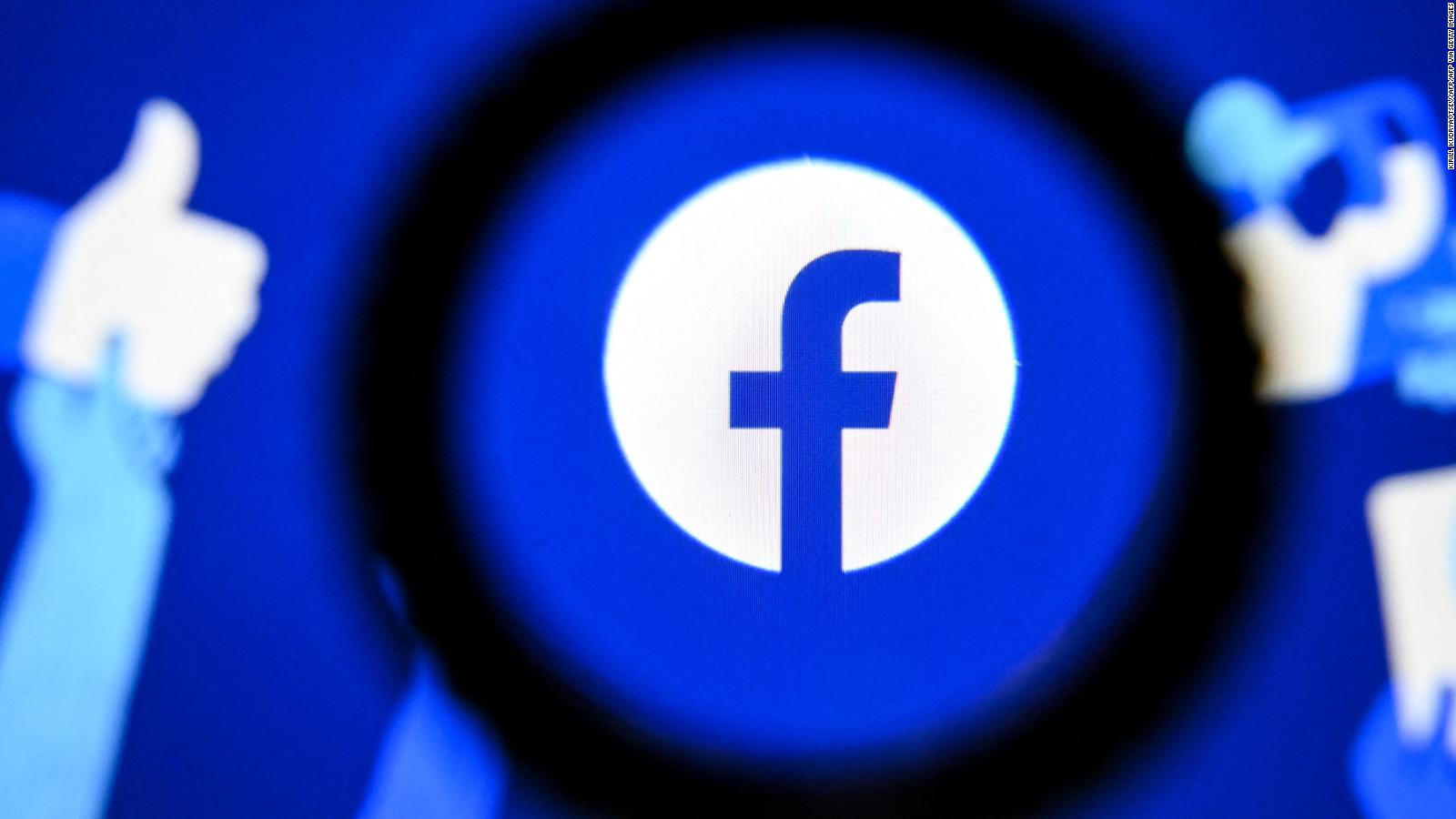Ads on Facebook comparing vaccines to the Holocaust 4:02
(CNN Spanish) -
Without a doubt, social networks live up to their name: they have "trapped" billions of people around the world to create or reinforce human relationships in the digital sphere (or at least that is the objective of these platforms from the "should be").
It is no exaggeration when it comes to billions at this point.
According to DataReportal -digital trend analysis site in which companies such as Kepios, Hootsuite and We Are Social are involved-, in October 2021, there were around 4,550 million active users of social networks around the planet, which it would be equivalent to 57.6% of the world population.
Although active users are not necessarily people, but rather accounts that have activity on social networks, it is a huge number.
Within this universe, the one that most "catches" users is Facebook.
According to DataReportal, Facebook is the most used social network in the world, with 2,910 million active users every month.
This data can also be verified in Facebook's financial report for the third quarter of 2021 (now Meta), in which we can see one more: all the company's social networks have 3,580 million monthly active users.
In addition, Meta has a presence as a messaging platform (for businesses and for the general public), connecting people, photographs, short videos, and more.
advertising
A net, literally speaking, has the ability to "catch".
Metaphorically, it involves an artifact that holds you against your will.
This is why we insist so much on this word.
It's not that the company founded by Mark Zuckerberg is holding billions of users against their will;
However, this year it showed that its platforms, especially Facebook and Instagram, can cause tangible, real damage, and its mechanisms are designed so that getting out is not easy.
Facebook, something is wrong (for a long time)
In mid-September of this year,
The Wall Street Journal
revealed, as part of its investigation called 'The Facebook files', that the company knew that Instagram was a toxic social network for many teenagers, especially women.
Facebook Research Finds Instagram Toxic to Many Teens
The American newspaper reviewed internal documents from Zuckerberg's company, in which it was found that Facebook researchers had conducted studies during the last three years on how Instagram affects its millions of young users.
Research shows that the platform can harm mental health and body image, especially among adolescent girls.
For her part, Karina Newton, head of public policy at Instagram, wrote in a statement that, while the social network can be a place where people have "negative experiences," it also gives a voice to marginalized people and helps friends. and family to stay connected;
He also stressed that Facebook's internal investigation demonstrated the company's commitment to "understanding the complex and difficult problems that young people can grapple with."
Despite these initial defenses, the repercussions of this report on Instagram would be remarkable for the company and would feed a snowball of problems that is growing more and more.
But we'll get to that.
Meanwhile, it is necessary to emphasize that, although this Instagram situation turned on the warning lights, Facebook had already been dragging problems for some time, such as the following three:
Spreading Misinformation About the 2016 U.S. Election
The Cambridge Analytica data breach scandal in 2018
The boycott of big brands against Facebook in 2020 for not doing enough to stop the messages with hate speech and disinformation
Facebook knew it could influence elections in 2016, but Zuckerberg denied that fake news had a real impact on voters' decisions: "Personally, I think the idea that fake news on Facebook - which represents a small portion of the content - they influenced the election is pretty insane where you look at it, "Zuckerberg said at the time.
In 2018, the founder of the company had to testify in Congress about the Cambridge Analytica scandal, although his responses were not entirely satisfactory. For example, Democratic Representative Frank Pallone pressured him to answer "yes" or "no" to the question of whether the social network would commit to changing its default settings to minimize data collection "as much as possible." "This is a complex issue that deserves more than one word for an answer," Zuckerberg replied, which Pallone called "disappointing."
And on the boitcot of 2020, the company continues to grapple with that this year.
Recently, in the framework of the "Facebook Papers" (which will be discussed later) and a new possible boycott, a Facebook spokesperson pointed out that "we have more than 40,000 people focused on this (on the issue of security for eradicate hate speech) and we are on track to spend more than $ 5 billion on safety and security in 2021. Although we have more work to do, we remain committed to getting this right. "
Why is Facebook facing a boycott?
1:31
As you can see, the problems have never completely stopped.
And, in addition, the snowball comes from long ago.
The difference is that this year's scandal added to that snow like never before.
And one of the people who made this possible was a former Facebook executive.
From directive to whistleblower
The Wall Street Journal
investigation
was based on thousands of internal Facebook documents.
Without a doubt, they were real.
But how did they get into the hands of journalists?
Thanks to the leak of an anonymous whistleblower.
In early October (just days after Antigone Davis, Facebook's global security director, testified before the US Senate Commerce Committee), the identity of the whistleblower was revealed: Frances Haugen.
In fact, she was the one who made her identity known on the "60 Minutes" program, two days before she testified before the US Senate Subcommittee on Consumer Protection, Product Safety and Data Security.
Haugen, 37, with experience in tech companies since 2006, joined Facebook in 2019 to work on civic integrity, including "issues related to democracy and disinformation," according to his website.
Those issues have been highlighted by critics of Facebook and other social media companies, particularly around the coronavirus pandemic and the 2020 U.S. presidential election.
She took the Facebook job as a product manager to work on tackling misinformation, she said in her "60 Minutes" interview.
But he explained that his feelings about the company began to change when the company decided to disband its civic integrity team shortly after the election.
To the problems of Facebook in the past should be added, according to Haugen, the digital organization of the movement that triggered the insurrection in the US Capitol on January 6, 2021.
She suggested that, in part, the decision to disband her civic integrity team allowed the platform to be used to help organize the riot on Capitol Hill.
Identity of Facebook whistleblower revealed 0:47
Zuckerberg's company disagreed with Haugen's statement.
Facebook noted that the work of the civic integrity team was distributed to other units when it was disbanded, and company executives rejected allegations that it was responsible for the disturbances on Capitol Hill.
Furthermore, immediately after the interview with Haugen with "60 Minutes" concluded, Facebook noted in a statement to CNN Business that "every day, our teams must balance protecting the ability of billions of people to speak openly with the need to keep our platform in a safe and positive place. "
However, this did not prevent Haugen's arrival in the Senate, nor did it prevent the snowball from continuing to grow.
Strongest scrutiny
Some Facebook leaders have come to testify to the United States Congress about past problems, including Zuckerberg himself, but in reality the company has not suffered major shocks from what happened.
Did Mark Zuckerberg get away with it in Congress?
2:04
The sentiment was different now after the Haugen leaks, the toxicity reports from Instagram and the hate groups on Facebook.
On Tuesday, October 5, Haugen testified before U.S. senators, highlighting several points in his testimony:
Frances Haugen alleged that the company is hiding the investigation into its shortcomings from investors and the public, and shared documents with
The Wall Street Journal
for a journalistic piece that revealed that Facebook researchers have repeatedly found Instagram to be toxic to teenage girls.
Facebook has vigorously rejected these reports.
Facebook's artificial intelligence (AI) systems "only detect a very small minority of offensive content," Haugen told congressional lawmakers.
"So the scale is 'can we do very cheap things for a large number of people?' Which is part of the reason they rely on AI so much. None of those ads may have been seen by a human, "he added.
Facebook is extraordinarily profitable, but Frances Haugen repeatedly refers to the company as being "understaffed."
He said this staff shortage contributes to a vicious cycle of platform-wide problems.
Frances Haugen pointed out to Senate lawmakers that Instagram has changed children's family lives.
"Children who are bullied on Instagram, the bullying follows them home. It follows them to their rooms. The last thing they see before going to bed at night is that someone is being cruel to them. Or the first thing they see. in the morning it's someone being cruel to them. The children are learning that their own friends, the people they care about, are cruel to them, "he said.
Facebook, for its part, responded the following:
As lawmakers asked whistleblower Frances Haugen about how Facebook attracts and treats young users, Facebook spokesperson Andy Stone tweeted that Haugen did not work directly on child safety issues at the company.
Haugen has been transparent about the fact that he did not work on child safety issues at Facebook;
He noted in a reply that although he has some knowledge of the subject, he did not work directly on it.
However, Haugen provided lawmakers with extensive internal documentation related to Facebook's investigation on the matter.
Also, prior to Haugen's testimony before Congress, Facebook Vice President and former British Liberal politician Nick Clegg spoke at length with CNN's Brian Stelter.
When asked if Instagram is toxic to teenagers, he replied that "not for all teenagers."
Haugen's testimony shook Facebook in a tangible way, because, as Sara Fischer, who covers media for Axios, told CNN, the company's share price fell 15% from its all-time high that it had reached just in September. .
Frances Haugen "took Facebook very by surprise," Fischer said.
After seeing that 15% drop, the scandal appears to be "having a material impact on their business," he added.
A very, very extensive documentation: the "Facebook Papers"
The internal documents that Haugen delivered not only gave for the investigation of
The Wall Street Journal
and for testimony in Congress, but they covered a vast terrain, so much so that it reached journalistic investigations around the world.
Another Facebook whistleblower is willing to testify before Congress
At the end of October, still with the turbulence of what Haugen said before a Senate subcommittee (where he asked that Facebook not be closed or dissolved, but that its regulation be taken seriously), the so-called "Facebook Papers" were published.
Haugen submitted more than 10,000 pages of internal Facebook documents as disclosures to the Securities and Exchange Commission, and also provided them to Congress in edited form when he testified in early October.
These documents (many used by
The Wall Street Journal
for its research) were reviewed by a consortium of 17 American news organizations, including CNN.
On Friday, October 22, the consortium began publishing a series of articles - collectively called "The Facebook Papers" - based on internal company documents.
What are the so-called "Facebook Papers"?
Four facts to understand the new scandal of the social network
The material offers deep insight into Facebook's internal culture, its approach to disinformation and hate speech moderation, internal research on its newsfeed algorithm, internal communication related to January 6, and more.
The documents, including an internal audit and a document showing in real time the countermeasures Facebook employees were belatedly implementing, paint a picture of a company that was in fact fundamentally unprepared to deal with the way the
Stop the
movement
Steal
used his platform to organize, and he only really came into action after the movement, which played a pivotal role in the Jan. 6 uprising on Capitol Hill, turned violent.
It was also known that Facebook employees repeatedly raised the alarm over the company's inability to stop the spread of messages that incite violence in "risky" countries such as Ethiopia, where civil war has raged during last year, internal documents viewed by CNN show.
According to those documents, Facebook has also known, at least since 2018, of the existence of human traffickers who used its platforms in this way.
Things got so bad that, in 2019, Apple threatened to withdraw Facebook and Instagram's access to the App Store, a platform the social media giant relies on to reach hundreds of millions of users each year.
Internally, Facebook employees were quick to remove problematic content and make emergency policy changes to avoid what they described as a "potentially serious" business consequence.
Facebook managed to allay Apple's concerns at the time and has denied the allegations of the investigation generally, saying that "at the core of these stories is a premise that is clearly false: that we don't put the people who use it first. our service, and that we conduct research that we then systematically ignore. "
However, the problems did not go away.
The focus continues to point to Facebook (Meta)
Not a week had passed since the "Facebook Papers" and Facebook raised its voice, although with a somewhat different message and, above all, that pointed to the future.
On Thursday, October 28, Mark Zuckerberg announced that Facebook was changing its name to Meta with immediate effect and that the company's aspirations were in the "metaverse."
"Today we are seen as a social media company," he added, "but, in our DNA, we are a company that creates technology to connect people. And the metaverse is the next frontier, just like social media was. when do we start".
Zuckerberg said the name was inspired by the Greek word "meta," which means "beyond."
"For me, it symbolizes that there is always more to build."
But all of this was coming in the context of wide scrutiny for the real-world damage allegedly caused by its various platforms.
In the same week that it changed its name, the company acknowledged to its shareholders that it faces "government investigations" related to the tens of thousands of pages of internal company documents leaked by Frances Haugen.
And more than a month later, the snowball, although perhaps at a slower pace, has not stopped growing.
On December 7, Instagram noted that it was rolling out a handful of new features aimed at making it harder for users, especially teenagers, to fall into loopholes that could be detrimental to their mental health.
That day, the social network launched the 'Take a Break' tool, which will encourage users to move away from the platform after having been browsing for a certain time.
The feature, announced in September, will arrive first to users in the United States, United Kingdom, Canada and Australia, and to all users in the coming months.
Within 24 hours, another Instagram executive testified before members of a Senate subcommittee.
This time it was the turn of Adam Mosseri, director of the social network.
During his appearance, Mosseri said that Instagram plans to bring back a version of its news feed that would give users the option of sorting content chronologically rather than ranking it according to the platform's algorithm, potentially addressing concerns about how. algorithms push users into harmful holes.
The company has been working on this function "for months" and plans to launch it in the first quarter of next year, Mosseri added.
The director of Instagram also recognized the need to update the regulations to maintain the safety of online users, as well as the need for more parental and user tools on the platform.
"Nothing has changed"
But the criticism has not stopped.
Democratic Senator Richard Blumenthal told the Mosseri hearing that children and their parents continue to struggle with the same problems on social media despite years of testimony from representatives of Instagram's parent company, now known as Meta.
"Nothing has changed. Everything keeps happening," said Blumenthal, who chairs the Subcommittee on Consumer Protection, Product Safety and Data Safety, in his opening speech on how the company has been slow to introduce changes.
"Meanwhile, more lives have been broken, real lives with families and real futures."
For her part, Republican Sen. Marsha Blackburn criticized the latest Instagram updates.
"While I am sure they know that we fully share the goal of protecting children and adolescents online, what we are not sure is how the half measures they have introduced are going to achieve it," she said.
Members of Congress have shown rare communion in criticizing tech companies when it comes to kids online.
Some lawmakers are pushing for legislation aimed at increasing children's internet privacy and reducing apparent addiction from various platforms, although it is unclear when that legislation will be passed.
Not if it will be approved.
With input from Samantha Murphy Kelly, Clare Duffy, Rishi Iyengar, Charles Riley, Donie O'Sullivan, Seth Fiegerman, Matt Egan, and Allison Morrow *









